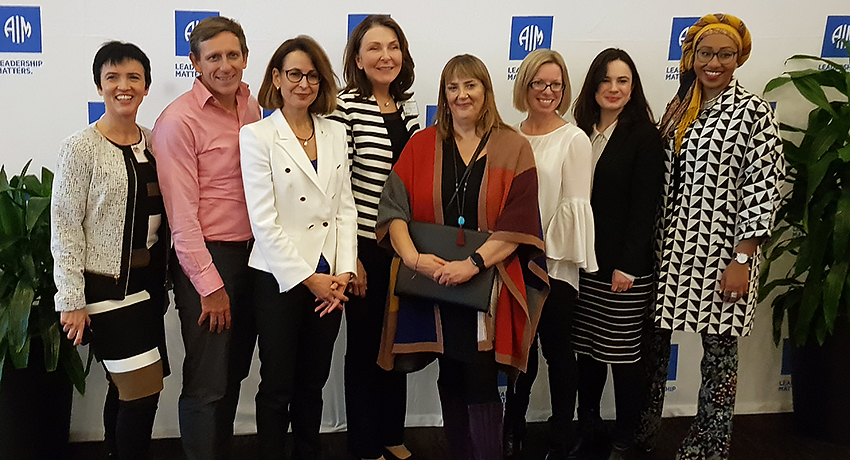The BroadAgenda team recently attended the Australian Institute of Management (AIM)’s Great Debate. The annual event attracted a full house of people passionate about the topic ‘Equal pay will close the gender gap’.
AIM had assembled an engaging and diverse panel of high-profile women to debate the issue. On the positive team, arguing that closing the gender pay gap would lead to gender equality, were Dr Saraid Billiards, Head of Strategy & Engagement for Science in Australia Gender Equity (SAGE); Alex Sloan, former 666 ABC Canberra presenter and 2017 Canberra Citizen of the Year; and Yassmin Abdel-Magied, a mechanical engineer, social advocate, writer, and 2015 Queensland Young Australian of the Year.
Arguing that equal pay for women would not automatically lead to closing the gender gap, the negative team was made up of speaker, author and creator of the Ambition Revolution program Amanda Blesing; Arabella Close, co-founder and co-organiser of fEMPOWER Workshops, a Sydney organisation running high school workshops on how to recognise and challenge gender inequality; and BroadAgenda chief editor and Director of the 50/50 by 2030 Foundation at the University of Canberra, Virginia Haussegger.
With MC Jane Caro keeping the audience laughing and the teams in line, the event raised funds for Canberra charity Kulture Break. However while the topic was dealt with in a light-hearted manner, with plenty of playful banter thrown in, each presenter touched on the serious issue of the gender pay gap and its underlying causes.
For the affirmative, Saraid Billiards’ thought-provoking opening speech highlighted the need for us as a society to change what we value, and how we reward certain types of work, particularly when it comes to raising children. The unpaid work deficit continues to undervalue women’s contribution to the society, and until we address that in the form of equal pay, the gender gap will not be closed.
despite their talent and ambition, many women striving for leadership positions face institutional barriers that go beyond their pay packet
The first speaker of the negative team, Amanda Blesing, in turn discussed her work mentoring professional women, and explained that despite their talent and ambition, many women striving for leadership positions face institutional barriers that go beyond their pay packet, a position widely acknowledged in the current body of literature.

Strike a pose! Amanda Blesing teaches the audience about the power of ‘the power pose’.
Alex Sloan argued that we need to stop categorising jobs as ‘pink collar’ or ‘blue collar’, for while what would be considered pink collar jobs – such as child care – are booming, a culture of masculinity in Australia, combined with lower rates of pay tend to deter men from taking on these roles.
Arabella Close reflected on her experience speaking to young people about gender inequality, highlighting that challenging conversations about gender need to occur well before they enter the workforce.
Yassmin Abdel-Magied captivated the audience with a story of a young girl’s conversation with her CEO father about how women were regarded in his company, and her realisation that money talks. Her concluding remark: ‘We cannot be equal until we are paid equally, and anyone who disagrees is probably getting paid more’ elicited an enthusiastic response from the audience, who were hanging to her every word.
Finally, our own Virginia Haussegger brought it home for the negative team, arguing that ‘it’s not about the money’. Pointing to US President Donald Trump’s attitudes towards women, including paying his own ex-wife $1 to run his companies, Virginia argued that in order to achieve true gender equality, we need to address the underlying and pervasive sexism that allows the gender pay gap to endure.
in order to achieve true gender equality, we need to address the underlying and pervasive sexism that allows the gender pay gap to endure
The winning team was decided by an audience clap-off, which awarded the victory to the negative team.
But as the audience filed out of the room after the lunch was over, what had we learned? And more importantly, when it comes to the gender pay gap, what will change? This is a theme we have addressed on BroadAgenda since launching in March, with blog posts from contributors arguing that not only do we need to value women’s work, we need more people to keep banging on about it in order to bring about change.
So, will equal pay close the gender gap? As the latest gender pay gap statistics fact sheet from the Workplace Gender Equality Agency (WGEA) states:
‘The gender pay gap is influenced by a number of interrelated work, family and societal factors, including stereotypes about the work women and men ‘should’ do, and the way women and men ‘should’ engage in the workforce’.
Unless these deeply ingrained social attitudes to the role of women are fundamentally changed, although closing the pay gap will go a long way to addressing the unequal position of women in the workforce and in society, it’s not just about the money.




